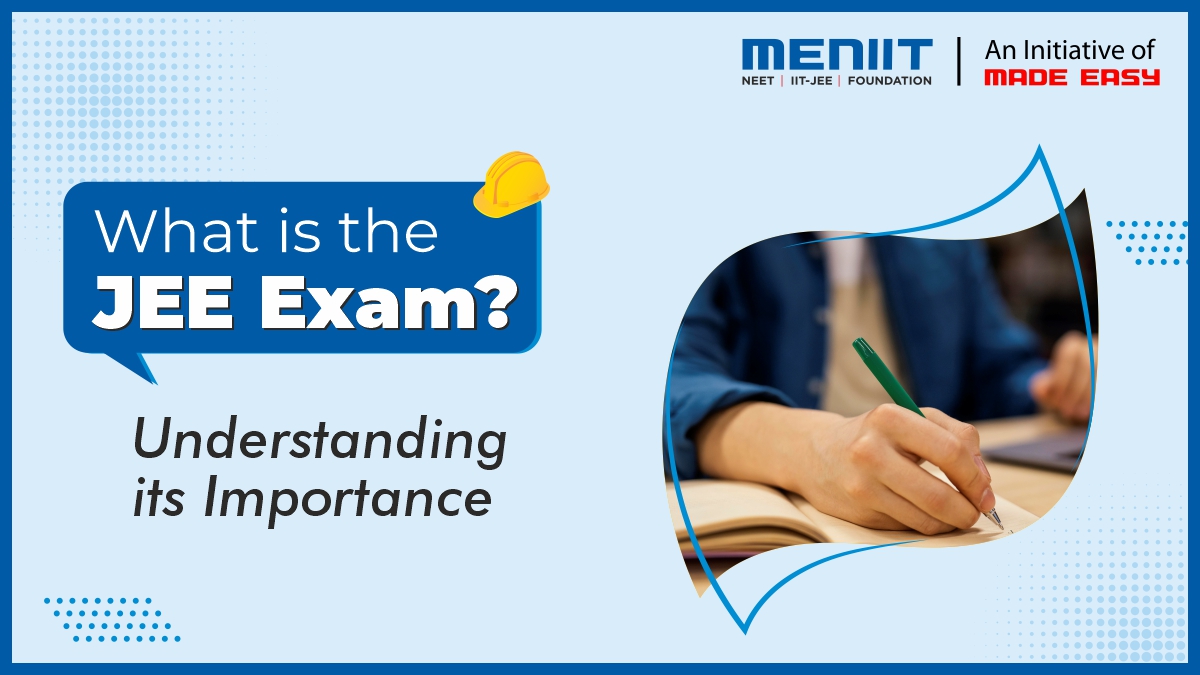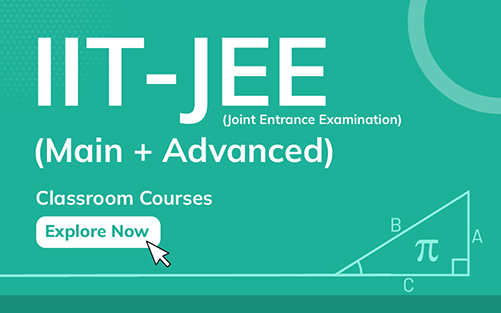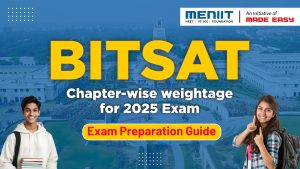What is JEE Exam? Understanding its Importance
Are you aiming for IIT JEE (Main + Advanced) ?
For IIT JEE aspirants, it is very important to understand each and every aspect of this highly competitive exam before starting their preparation.
To crack JEE (Main + Advanced), dedication, hard work, and an effective strategy are required. By understanding the exam pattern, the updated JEE (Joint Entrance Examination) syllabus, following a well-structured preparation strategy, reading exam-oriented study materials, and managing a healthy mental balance, you can increase your chances of securing a seat in a prestigious engineering college or institution.
In this blog, we will do an in-depth analysis of both exams: JEE (Main + Advanced), such as the latest JEE 2025 syllabus, exam pattern, eligibility criteria, etc.
We will look into different important aspects of JEE Main and JEE Advanced in a detailed manner and address some frequently asked questions.
Table of Contents
What is JEE Exam?
The Joint Entrance Examination- JEE or also known as IIT-JEE is a national level prestigious engineering entrance examination for aspiring engineers in India.
IIT-JEE is divided into two stages—JEE Main and JEE Advanced. It is an admission test for the Indian Institutes of Technology (IITs), IISc (Indian Institute of Science), National Institutes of Technology (NITs), and other centrally funded technical institutions.
JEE Main is conducted twice a year by National Testing Agency (NTA) whereas JEE Advanced is conducted once in a year by the IITs. JEE Main is the first stage of IIT-JEE. Those who clear JEE Main are eligible for JEE Advanced.
| Topic | Details |
|---|---|
| Subjects | Physics, Chemistry and Mathematics |
| Total number of questions | 90 |
| Compulsory question | 75 |
| Types of Questions | Section A: MCQ based 20 questions |
| Section B: Numerical based 10 questions | |
| Marking Scheme | +4 for every correct response |
| Negative Marking | -1 for every incorrect response |
| Time Duration | 3 hours |
| Total Marks | 300 |
Importance of JEE Exam
JEE Main
JEE Main is the initial phase of the examination, designed to assess a candidate’s understanding of Physics, Chemistry, and Mathematics. It is conducted twice a year in the months of January and April, offering students flexibility in choosing their attempt. The exam comprises multiple-choice questions (MCQs) and numerical value-based questions.
The aim of JEE (Main) is to conduct two testing sessions to categorise candidates suitable for sitting in JEE (Advanced) or gaining admission to a Bachelor of Engineering (BE), Bachelor of Technology (B. Tech) undergraduate programme, Bachelor of Architecture (B. Arch) or Bachelor of Planning (B. Planning) programme at one of the following types of institutions:
- National Institutes of Technology (NITs)
- Indian Institutes of Information Technology (IIITs)
- Government Funded Technical Institutes (GFTIs)
- State government colleges and private colleges
Eligibility Criteria for JEE Main
Educational Qualification(s): A candidate must have passed or be appearing for their 10+2 or equivalent examination from any recognised board with Physics, Chemistry, and Mathematics as main subjects.
Note: A candidate must have obtained a minimum of 75% marks for the unreserved category and 65% for the OBC, SC/ST, and PWD categories at the qualifying examination.
Age Criteria:
There is no age limit restriction to appear for JEE Main
JEE Main Exam Pattern
JEE Main is conducted in fully Computer-Based Test (CBT) mode, twice in a year. The best of two papers score is considered for the All India Rank (AIR).
Latest JEE Main Syllabus 2025
The syllabus for JEE Main is typically based on topics in Physics, Chemistry, and Mathematics.
It is extensive and covers a wide range of concepts from these subjects. Candidates should refer to the official website for the detailed syllabus.
Click here to download JEE Main Syllabus 2025
JEE Main Cut Off
The cutoff for JEE Main varies each year and depends on various factors like the difficulty level of the paper and the number of applicants.
Cutoffs are released category-wise, with different minimum scores required for general, OBC, SC, and ST candidates. Securing a position among the top percentiles is required for eligibility for JEE Advanced.
JEE Main Qualifying Cut-Off
The JEE Main qualifying cut-off is the minimum score that candidates should achieve in the entrance exam to appear for JEE Advanced. The JEE Main qualifying cut-off, released by the National Testing Agency (NTA).
JEE Advanced
JEE Advanced is the next level for those who qualify in JEE Main. This exam is the key to securing admission to the prestigious IITs.
The pattern includes multiple-choice questions, numerical-answer type questions, paragraph-based questions, and match the following questions.
Eligibility Criteria for JEE Advanced
Eligibility: To appear for JEE Advanced, a candidate must qualify for the JEE Main, which is the first stage of the two-part JEE.
👉🏻 Click here to download the official brochure of JEE Advanced 2025
Performance in Class XII (or Equivalent) Board Examination for admission to IITs
The Candidates must full-fill at least one of the following two criteria with Physics, Chemistry, and Mathematics as compulsory subjects in the year of first appearance in the Class XII (or equivalent examination):
- A candidate must have secured at least 75% aggregate marks in the Class XII (or equivalent) Board examination. The aggregate marks for SC, ST and PwD candidates should be at least 65%.
- A candidate must be within the category-wise top 20 percentile of successful candidates in their respective Class XII (or equivalent) board examination.
Age limit for JEE Advanced
A candidate should have been born on or after October 1, 2000. Five-year age relaxation is given to SC, ST, and PwD candidates, i.e., these candidates should have been born on or after October 1, 1995.
JEE Advanced Exam Pattern
JEE Advanced is a Computer-Based Test (CBT) and consists of two papers – Paper 1 and Paper 2.
The exam primarily assesses a candidate’s understanding of Physics, Chemistry, and Mathematics. The questions are typically of a higher difficulty level compared to JEE Main.
Number of attempts: A candidate can attempt JEE Advanced maximum of two times in two consecutive years.
Latest JEE Advanced Syllabus 2025
Candidates should refer to the official JEE Advanced website for detailed information.
👉🏻 Click here to download official JEE Advanced 2025 Syllabus
JEE Advanced Cut-off
The JEE Advanced exam is highly competitive. The cutoff is the minimum score required to pass the exam stage. Those scoring equal to or above the cutoff can participate in the counselling process.
The cutoff and rank list are crucial for admission to the top IIT institutes in the country. The conducting authority releases two types of cutoffs: the admission cutoff and the qualifying cutoff, which depend on various factors and may vary annually.
Frequently Asked Questions (FAQs)
What is the purpose of the JEE exam?
The main purpose of the Joint Entrance Examination (JEE) is to select meritorious candidates for admission in engineering programs to prestigious institutions in India (IITs, NITs, and other top engineering colleges). The JEE is conducted in two parts, commonly known as JEE Main and JEE Advanced.
What is the use of JEE percentile?
The JEE main percentile are important for:
- Determining eligibility for JEE Advanced
- Calculating the national-level ranking of candidates
- Establishing cutoffs for various engineering institutes
- Deciding admission into NITs, IITs, and other state engineering colleges.
Are 12th-grade marks important for JEE Advanced?
Yes, 12th marks are important for JEE Advanced as they are considered during the admissions process. However, the final selection is based on the JEE Advanced score and other factors such as cutoffs, category reservations, and performance in the JEE Advanced exam. Students should have secured at least 75% marks in the Class 12 examination or be in the top 20 percentile in the Class 12 examination conducted by respective boards. For SC / ST candidates, the qualifying marks should be 65% in the Class 12 examination. The candidate is also required to pass each of the subjects of the Class 12 or qualifying examination.
Who is eligible for the JEE Main exam?
To be eligible for JEE Main, candidates must have completed their 10+2 or equivalent examination with Physics, Chemistry, and Mathematics as main subjects.
- There is no age limit for appearing in JEE Main.
- Candidates can attempt JEE Main for three consecutive years.
Dear Aspirants!
MENIIT is a platform where you can get expert insights and invaluable study tips on IIT-JEE, NEET, and other entrance examinations. Stay ahead of the competition with MENIIT. Ace these exams with our proven strategies, and stay informed about the latest exam updates and precious tips from our experts.
So, hurry up, subscribe to the MENIIT YouTube channel now, and never miss an update on new videos.

















